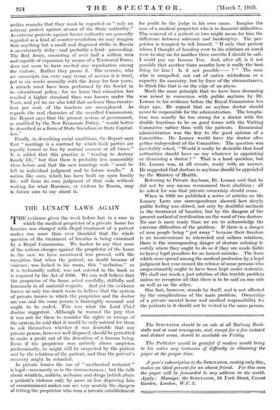THE LUNACY LAWS AGAIN"
THE evidence given the . week before last in a ease in which the medical proprietor of a private home for lunatics was charged with illegal treatment of a patient makes one more than ever thankful - that the whole question .of the treatment of lunatics is being examined by a Royal Commission. We hasten to say that none of the serious, charges against the proprietor of the home in the case we have mentioned was proved, with the exception that when the patient, no doubt because of violence, was locked -in his room, this " seclusion," as it is technically called, was not . entered in the book as is required by the Act. of 1890. We can well believe that the proprietor of the home acted carefully, skilfully and humanely, in all material respects. And yet the evidence leaves. us. only. too much room to believe that the system, of private homes- in which the proprietor. and the doctor are one- and the same person is thoroughly unsound and ought to be ended. This was what the Lord. Chief Justice suggested. Although he warned the, jury that it was not for them to consider the rights or wrongs of the system, he said that it would be only natural for them to ask themselves whether it was desirable that any private person, however well disposed, should be permitted to make a profit out of the detention of a human being. Even if the proprietor was entirely above suspicion professionally, he might still be suspected by. the patient and by therelations of the patient, and thus the patient's recovery might be retarded.
In private homes the use of " mechanical . restraint " is lewd—necessarily so in the circumstances ; but the talk about wristlets, anklets, seclusion and drugs, (which abate a patient's violence only by more or less depriving. him- of consciousness) makes one see very acutely the dangers. of letting the proprietor who runs a private establishment for profit be the judge in his own cause. Imagine the case of a medical proprietor who is in financial' difficulties. The removal of a patient or two might mean for him the difference between-solvency and bankruptcy. The pro- prietor is tempted to tell himself, " If only that patient whom I thought of handing over to his relations as cured were to stay on for another, three months I should be safe. I could pay my Income Tax. And, after all, is it not possible that another three months here is really the- best: thing for him ? Is it not possible— ? " The man who is compelled, not out of native wickedness or a capacity for casuistry, but by force a the circumstances, to think like that is on the edge of an. abyss. Much, the same principle that we• have been discussing was raised in connexion with public asylums by Dr. Lomax in his evidence before the Royal- Commission ten days ago. He argued' that an asylum doctor should never be responsible for the administration. The tempta- tion was usually far too strong for a doctor with the double •functions to be on good terms with the Visiting Committee rather than with the patients. Economical administration was' the -key -to, the good opinion of a Committee. Dr. Lomax , would have the doctor alto- gether -independent of the Committee. The question was inevitably asked, " Would it really be desirable that local authorities should' have • no say -whatever in appointing or-dismissing a doctor ? " That is a hard' questions but Dr.. Lomax was, at all events, ready with an answer. He suggested that doctors in asylums should= be appointed by the • Ministry of Health.
Referring to Private Asylums, Dr. Lomax said- that he did, not by -any means recommend their abolition ; all he asked for was that private ownership should' cease.
When 'in 1923 we published a series of articles on the Lunacy Laws our correspondence- showed how deeply public feeling was stirred, not only by doubtful methods in the treatment of lunatics, but by -the dangers of the present method of certification on the word of two doctors No one is more ready than we are to acknowledge the extreme difficulties of the problem.' If there, is a danger of sane people being " put away " because their freedom is an inconvenience to interested and callous relations, there is the corresponding danger of doctors refusing tc certify where- they ought to do so if they are made liable to heavy legal penalties for an honest mistake. The fears which were spread among the medical profession by a legal judgment last year caused the release of some persons-who unquestionably ought to have been kept-under restraint. We shall not reach a just solution of this terrible problem unless we recognize all that there is to be said on- one side as well' as on the other; One' fact, however, stands by itself, and is not affected by the- complications of the main problem. Ownership of a private mental home and medical responsibility for the patients in it should not be vested in the same person.


























































 Previous page
Previous page